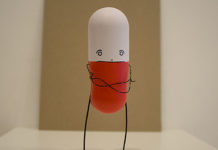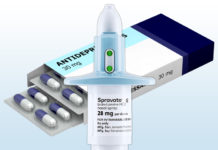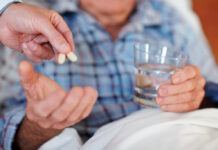Minimal Empirical Support for Antidepressant Treatment in Young People
Researchers from Australia reviewed the existing literature for good-quality evidence of effective prevention and treatment of depression in young people. Prevention research was dominated...
Suicide Warning on Antidepressant Label is Justified, Researchers Say
Researchers confirm that the suicide warning for antidepressants is justified by the evidence and that claims that the warning is harmful lack support.
New Research on Prenatal SSRI Exposure and Autism
Does maternal SSRI exposure increase the chances that a child will develop characteristics associated with Autism Spectrum Disorder (ASD)?
Antidepressants Have No Effect On Bipolar Depression
In a review of 68 articles published between 2005 and 2011, Israeli researchers found that most well-controlled studies failed to show a significant effect of...
SSRIs and Benzodiazepines Associated with Problems in Infants
Infants exposed to SSRIs and benzodiazepines during pregnancy show impaired neurologic functioning in the first month after birth, according to a new study published in the American Journal of Psychiatry. While infants exposed SSRIs alone showed neurobehavioral effects throughout the first month, those exposed to an SSRI and a benzodiazepine had more significant problems.
Antidepressants Plus Immune Response Terminate Pregnancies in Mice
Also, male mice born to mothers with an immune response exhibited “autistic-like” behaviors, scientists report.
New Rating Tool for Tapering Antidepressants and Antipsychotics
Researchers developed a rating scale to better assess service users’ experiences tapering antidepressant and/or antipsychotic medication.
Ambushed by Antidepressant Withdrawal: The Escape Story
I’m alive. More than 30,000 veterans in the past decade alone are not. I was not warned of the risks of this drug. I was not told that once on it, I might never be able to get off it, or the nightmare that would ensue when I tried. I know millions of others were not told either.
New Data Reveal the Full Extent of STAR*D Failure
The initial study, which has been used to promote antidepressants, employed outcome switching to hide poor results.
Researchers Challenge Evidence for Antidepressants in Youth
Researchers shed light on the precarious nature of evidence from efficacy trials of antidepressant medication to treat symptoms of major depressive disorder in children and adolescents.
CBT More Cost-Effective Than SSRI for Panic Disorder
A two-year study of 150 panic-disorder patients found that the societal cost of cognitive-behavioral was less than that of CBT plus SSRI or SSRI...
SSRIs Impair Learning From Negative Feedback
A study comparing the effects on cognition of major depression (MDD) vs. SSRIs finds that healthy subjects learn significantly better from positive feedback than...
Majority of Anorexia Patients are Prescribed Psychotropics Despite Lack of Data
Research from the medical schools of Harvard University and the University of Melbourne, reported in the December International Journal of Eating Disorders, found that...
Outcome of Mood Disorders Before Psychopharmacology
A "systematic review" of all outcome studies of patients with mood disorders, in the March issue of the Australia & New Zealand Journal of...
New Research Questions Safety of Esketamine for Depression
An analysis of FDA adverse event reports related to esketamine shows the potential for negative effects such as suicidal and self-injurious ideation.
Antidepressant Use Associated With Menstruation Disorders
In a study of 793 women taking antidepressants and 639 not taking them, researchers in Turkey found that menstruation disorders were significantly associated with...
Animal Study Shows Impact of Prozac in Pregnancy on the Child
Researchers found that rats born to mothers given the antidepressant Prozac during pregnancy or breastfeeding exhibited varied behavioral and developmental effects, with implications for the understanding of antidepressant impacts during human pregnancies.
Discontinuing Psychotropics Reduces Falls in Elderly
Australian researchers look at the literature on the effect of psychotropics on falls in the elderly; largest effect of any randomized trial was achieved...
Prenatal Antidepressant Exposure Raises Risk to Newborn of Pulmonary Hypertension
Researchers from Canada find the risk of persistent pulmonary hypertension of the newborn is increased for infants exposed to SSRIs in late pregnancy. Results...
US Government Reviews Antidepressants During and After Pregnancy
The U.S. Department of Health and Human Services’ Agency for Healthcare Research and Quality has released a meta-analysis “Evidence Report” of the studies into...
Autism Linked to Antidepressants During Pregancy
A study of the Swedish medical birth registry, conducted by researchers from Sweden, the U.K., and the U.S.A., found a 3.3X greater risk of...
Antidepressant Use Linked to Dementia
A new study finds that elderly individuals using antidepressants are at significantly higher risk for dementia compared to depressed individuals who did not take the drugs.
New Guidance on Antidepressant Withdrawal for Doctors in the UK
New guidance for primary care doctors in the UK on antidepressant discontinuation acknowledges severe and long-lasting withdrawal symptoms.
Suicide Attempts Similar With Various Antidepressants for Children
Researchers from Vanderbilt University and the University of Alabama found, in a retrospective study of increased suicidal behavior among 36,842 children who were new...
Meta-analysis Shows Antidepressants Offer Little to No Benefit to Well-Being of Depressed Children and...
Seeking to rectify the fact that "no meta-analysis has included measures of quality of life, global mental health, self-esteem, or autonomy" (or self-reports of...




















